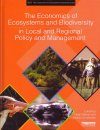![The Economics of Ecosystems and Biodiversity in Local and Regional Policy and Management The Economics of Ecosystems and Biodiversity in Local and Regional Policy and Management]()
Click to have a closer look
About this book
Contents
Customer reviews
Biography
Related titles
About this book
In this volume of the TEEB (The Economics of Ecosystems and Biodiversity) publication series, the key concepts of the project are applied to local and regional policy and public management. The aim is to show that in considering nature first and foremost, decision makers can promote local development to ensure human well-being and economic growth and stability, while maintaining environmental sustainability.
The Economics of Ecosystems and Biodiversity in Local and Regional Policy and Management explores the potential for local development provided by an approach based on nature. It offers examples of successful implementation of this approach from across the world, highlighting the importance of local decision making in management and planning. It provides tools and practical guidance for reform, and throughout the volume the economic benefits of environmental consideration at a local level are expounded.
The Economics of Ecosystems and Biodiversity in Local and Regional Policy and Management is intended to offer inspiration and practical suggestions for the improvement and sustainable management of the environment and human well-being. The local aspect of this book complements the focus of the previous three volumes, completing the set to provide a comprehensive approach to simultaneously improving and maintaining economic and environmental stability, as well as human well-being.
Contents
Part 1: The Opportunity
1. The Value of Nature for Local Development
Part 2: The Tools
2. Conceptual Frameworks for Considering the Benefits of Nature
3. Tools for Evaluation and Appraisal of Ecosystem Services in Policy Making
Part 3: Practical Applications - Planning and Management
4. Ecosystem Services in Cities and Public Management
5. Ecosystem Services in Rural Areas and Natural Resources Management
6. Spatial Planning and Environmental Assessments
7. Ecosystem Services and Protected Areas
Part 4: Practical Applications - Creating Markets
8. Payments for Ecosystem Services and Conservation Banking
9. Creating Markets to Conserve Biodiversity - Conservation Banking
10. Certification and Labelling
Part 5: Conclusions
11. Making Your Natural Capital Work for Local Development
Appendix 1: Tools and Databases
Customer Reviews
Biography
Heidi Wittmer heads the working group on governance and institutions for sustainable use of landscapes at the Helmholtz Centre for Environmental Research, Germany, where she leads the scientific co-ordination of TEEB. Her previous work has focused on the governance of natural resources, especially biodiversity and water, applying concepts from institutional economics, political resource theory and discourse analysis.
Haripriya Gundimeda is an associate professor with the Department of Humanities and Social Sciences at the Indian Institute of Technology in Bombay, India. She has worked at many notable institutions around the world, on various issues relating to environment and development economics and green accounting. Haripriya has also been the lead author of six of the eight monographs for the Green Accounting for Indian states Project initiated by the Green Indian States Trust.

































